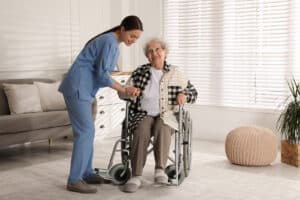
Transitioning from hospital to home is a significant step in the recovery process for seniors, especially considering the potential complications that can slow down or completely stop their recovery if not properly managed during post hospital care. Educating seniors about these complications and how to recognize and manage them effectively is crucial for a successful recovery.
Understanding Common Post-Hospital Complications
While not all situations are the same, one thing is consistent: the need for support and post hospital care when seniors are discharged. With the right resources in place, seniors may avoid some of the complications listed below:
Infections
Infections, particularly surgical site infections and urinary tract infections, are common post-hospital complications. Seniors may be more susceptible due to weakened immune systems or the presence of chronic conditions. Recognizing early signs of infection, such as redness, swelling, fever, and unusual discharge, is critical for prompt treatment.
Medication Errors
Managing multiple medications can be overwhelming, leading to potential errors in dosage or timing. Medication errors can also result in adverse drug reactions, decreased effectiveness, or dangerous interactions. Post hospital care should educate seniors on proper medication management and the importance of adhering to prescribed regimens.
Blood Clots
Post-hospital immobility increases the risk of blood clots, particularly in the legs (deep vein thrombosis). Symptoms include swelling, pain, and redness in the affected limb. Understanding the importance of movement, compression stockings, and prescribed anticoagulants can help prevent this serious complication.
Dehydration and Malnutrition
Seniors may experience decreased appetite or difficulty swallowing after hospitalization, leading to dehydration and malnutrition. Recognizing signs such as dry mouth, dizziness, fatigue, and weight loss is vital. Proper hydration and balanced nutrition are key components of recovery.
Falls
Hospitalization can weaken seniors, increasing the risk of falls at home. Educating them on fall prevention strategies, such as using assistive devices, ensuring a safe home environment, and performing strength and balance exercises, can significantly reduce this risk.
How Proper Post Hospital Care Can Help
Proper post hospital care involves a coordinated approach that includes follow-up appointments, home care, and support from various healthcare providers. This ensures that all aspects of a senior’s recovery are addressed comprehensively.
Developing personalized care plans based on seniors’ needs and health conditions can also help manage and prevent complications. These plans should include specific instructions for medication management, physical therapy, dietary requirements, and regular monitoring.
In addition, establishing a strong support system is crucial for successful recovery. Family, friends, and community resources, as well as home care, can provide emotional support, assist with daily activities, and ensure that seniors adhere to their post hospital care plans. This support system can also ensure that seniors get the regular monitoring they need, such as blood pressure, blood sugar levels, and weight history, which can help detect potential complications early. Home health can provide this ongoing monitoring, offering peace of mind to both seniors and their families.
Educating seniors about common post-hospital complications and how to recognize and manage them effectively is a significant part of successful recovery. Proper post hospital care, combined with informed and empowered seniors, can significantly reduce the risk of complications, prevent readmissions, and promote a smoother, more efficient recovery process.
If you or an aging loved one are considering Post Hospital Care in Berkeley, CA, please contact the caring staff at Aviva In-Home Care today at (415) 463-1400
Aviva In-Home Care provides exceptional senior home care in the Bay Area, including San Francisco, Burlingame, San Mateo, Hillsborough, Atherton, Menlo Park, Palo Alto, Berkeley, Lafayette, Orinda, and surrounding areas.
- How To Help Your Senior Parent Feel Their Best Every Day - May 14, 2025
- Preventing Falls in the Yard - May 6, 2025
- Reducing the Risk of Sarcopenia (muscle loss) in the Elderly - April 22, 2025



